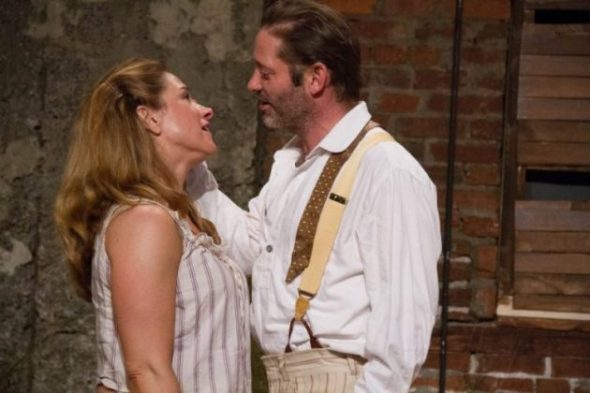
Aipotu by John Guare. Directed by Lane Savadove. EgoPo Classic Theater. March 2018.
The major revelation of part two of the Lydie Breeze trilogy is how dramatically the characters change.
I expected a different, more intimate focus as the action shifted from a Civil War battlefield to a commune on the island of Nantucket. And I could anticipate a shift from epic drama to intimate realism, as the cast includes virtually no one other than Lydie and the three men who accompany her to the island.
But I did not foresee that those four individuals would be so transformed from the people we met at Cold Harbor. When the idealistic Lydie returned to her family’s roots in Nantucket she spoke of how “anything can happen.” Now we are in the presence of a pragmatic, transactional woman who wants to entice people to come to her commune as a money-raising scheme.
They named the commune Aipotu because that’s utopia spelled backwards, but visionary high-mindedness has given way to jealousies and bickering among Lydie (Melanie Julian), her husband Joshua (Charlie DelMarcelle) and her sometime-lover Dan (David Girard.) Their comrade on the island is the stammering, simple-minded Amos (Ed Swidey) who is the butt of taunts by the others.
So there are surprises in the first act of Aipotu, but there’s outright shock when we get into its second act. The transformation packs such a punch that I refuse to ruin the element of surprise by disclosing what happens. The story of these individuals gains extra resonance as Guare’s script involves them with politics in the late 19th century.
Director Lane Savadove’s concept and Markéta Fantová’s sets impressively tell the story as the detailed props underline the narrative. Original music in the style of the era by Jay Ansill and Cynthia Hopkins is played by a small ensemble situated above the playing area and, in a clever touch, they perform more of that music during the intermission break.
Julian is even more impressive here than she was in the first play of the trilogy; her character faces deeper challenges and she rises to the occasions magnificently. DelMarcelle displays his devotion to higher causes with sensitivity. Girard provides contrast with his strong portrayal of opportunism. As for Swidey, let’s just say that he’s revelatory.
Costumes by Marie Anne Chiment and lighting by Mike Inwood are essential ingredients in the drama.
Now we await the denouement, and the solving of some puzzles, in the final play of Guare’s trilogy, Home, coming from EgoPo next month.